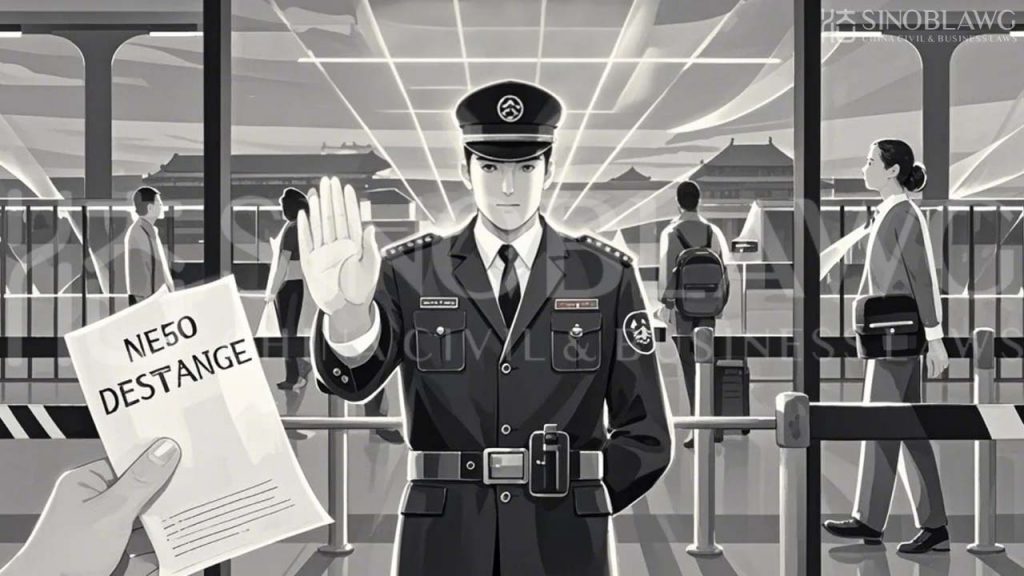That will be the least thing you want to hear when you are about to exit China at airports. But it may likely happen when you or the company you serve is involved in a lawsuit in China in which you may be subject to certain obligations.
Recently, one of my corporate clients consulted me regarding whether its legal representative (an American) would be restricted or banned from leaving China as the WFOE company in which this American serves as legal representative will probably be sued for breach of guaranty contract. I understand this is a serious problem for any westerner as being restricted or banned from exiting China will mean a loss of freedom to a large extent.
Here I (Jason Tian – Chinese lawyer) summarize the current regulations concerning restrictions on foreigners from exiting China.
I. In what situations I shall be banned from leaving China?
In accordance with Law on Foreigners Entry and Exit of Chinese Territory, foreigners may be banned from leaving China in the following situations:
(1) They are criminal suspects in criminal cases;
(2) They are involved in civil cases that are yet to be settled;
(3) They have committed other violations of Chinese laws that shall be pursued for legal liabilities.
(Here in this article, we only discuss the restriction or bans that may be imposed during civil cases (including cases in which economic and commercial disputes are tried))
In accordance with revised China Civil Procedures Law, persons (natural or corporate) subject to enforcement proceedings may be banned from leaving the country.
Based on these rules, it can be inferred that after a case is entertained by court all the way till the end of enforcement of judgment thereof, a foreigner can be banned by court (generally at the request by the other party to the dispute) from exiting China at any time.
It is not clear whether a court will impose such a ban before a case is filed. In practice, courts are divided on that depending on their interpretation of the nature of such a compulsory measure. It is my personal opinion that without a clear authorization by laws, courts shall refrain from taking such harsh actions that may lead to unnecessary rows between states/countries.
II. Who will be banned?
For individual foreigners caught in Chinese litigation, they themselves will be subject to such a risk. This question often arises where a foreign invested company with foreign management team is involved in litigation. Just as the same as in the case with my client mentioned above, foreign managers/representatives are very concerned whether they will be banned from leaving China because of their company is sued.
In this regard, the judicial interpretation for the provision relating to enforcement in the China Civil Procedures Law as mentioned above has made it clear that if the person subject to enforcement/execution is a corporate entity, the legal representative, person-in-charge and other directly responsible person may be banned from exiting China.
However, it is unclear whether courts will grant permission to ban foreign executives from leaving China during the trial stages, the trials of first and second instances. Again, I think without clear legal authorization, courts should be very prudent in exercising such power. But there are scholars holding otherwise, arguing that the court should be left with the discretion of deciding on whom in the organization may be ordered from leaving China if justice compels such an order.
III. How long will I be banned from leaving China?
Apparently, this is another important question that needs an answer. However, there is no clear limitation on the length of banning. Upon meeting certain conditions, such a ban will be lifted.
The aforesaid judicial interpretation provides that, during the period of banning, if (1) the debts determined in the judgment or other valid legal documents are satisfied by the person subject to enforcement, (2) the person subject to enforcement provides adequate guarantee, or (3) the person applying for enforcement agrees, court shall (in the case of (1)) or may (in the case of (2) and (3)) lift the ban.
IV. Ban in bankruptcy proceeding
According to China Bankruptcy Law, during the period from the date of court accepting a bankruptcy case to the date of closing of the proceeding, the court may order that relevant persons of the company which is the subject of the proceeding not to leave their domiciles. Such relevant persons shall include in the first place the legal representative of the company, and upon approval by courts, financial officers and other executives.
So in the event that your company in China is going to go bankrupt, you may wish to remove yourself from those corporate positions that may render you to court ban from leaving China.
You are welcome to contact the author, Jason Tian at his working emails and phones set out at the top right corner of this page.






So what happens if your visa runs out during the forced stay in China?
In that case, you don’t worry about expiration of your visa any more. You can stay.